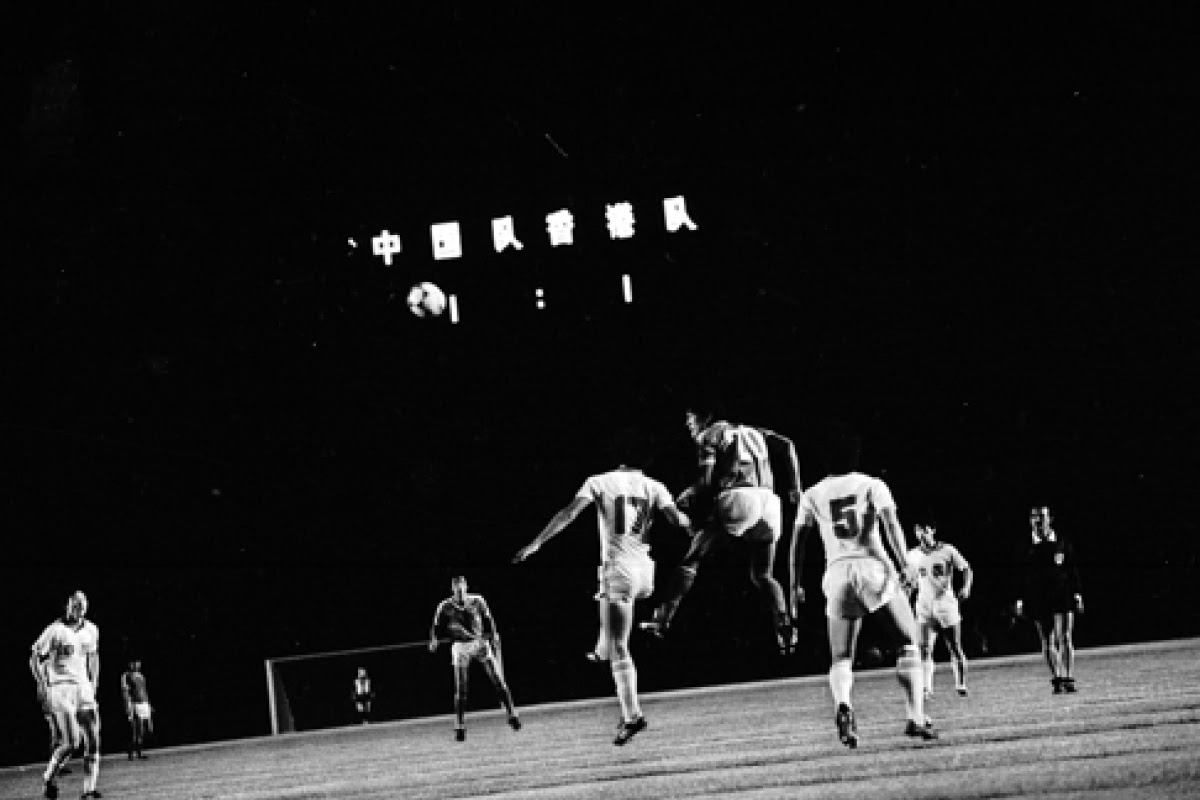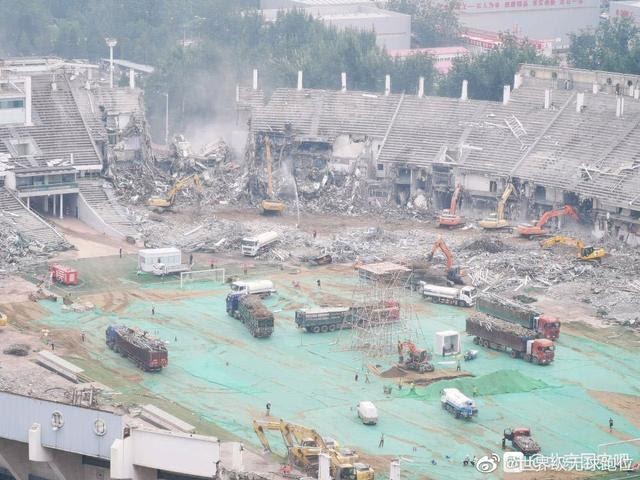The ‘May 19 Incident’: When Hong Kong football sparked a riot in Beijing
On May 19, 1985, Workers' Stadium in Beijing hosted a World Cup qualifier between China and Hong Kong, in which China only needed a draw to advance to the next round. Few could have predicted what would happen next.

Under the glare of the floodlights at the Workers’ Stadium in Beijing, the noise of 80,000 fans in his ears, Wu Kwok-hung loitered over a dead ball in his usual languid style, mulling his options.
Hong Kong had a free kick 30 yards from goal, 20 minutes into a World Cup qualifier against China.
Facing the left wing and feigning a pass in that direction, he rolled the ball stealthily behind his back into the path of defender Cheung Chi-tak, who scudded a first-time effort into the top-left corner of Lù Jiànrén’s 路建人 goal, making it 1-0.
On the concrete terraces, many China fans were furious, fearing for their side’s chances of taking to the global stage in Mexico the following summer.
It was May 19, 1985, and Hong Kong was on its way to a historic win that would spark a riot.
Back in the present day, the unstoppable march of demolition and replacement through Beijing has finally come for the Workers’ Stadium.
The ascetic modernist bowl in the city’s heart, a stubborn holdout amid the glamorization of the surrounding Sanlitun district, was almost entirely knocked down last week to make way for a more up-to-date reincarnation.
Since its construction in 1959, as part of a slate of statement structures meant to assert the capital’s prestige a decade after the victory of communism, Gōngtǐ 工体 (as it is popularly known) has played host to everything from athletics and Olympic soccer to concerts by artists including Jay Chou and Linkin Park.
But in Hong Kong, there is only one event there that anyone cares to remember: the May 19 incident.
The game came as relations shifted between affluent, cosmopolitan Hong Kong and the insular, poorer China. The People’s Republic, newly welcomed into the global community, was seven years into its decades-long period of propulsive economic transformation.
Exactly six months earlier, Britain had formally agreed that it would return Hong Kong to China in 1997, putting an expiry date on what the Communist Party saw as more than a century of colonial humiliation.
It was the last group game in qualifiers for the 1986 World Cup in Mexico, at which China — previously ostracized by football bodies such as FIFA and the AFC — hoped to make its debut at a major global tournament.
Both sides had beaten Brunei and Macau twice each, and played out a 0-0 draw in Hong Kong. China, with a superior goal difference, needed only a draw to make the next round, while Hong Kong would have to win.
China were firm favorites, but Gongti’s cauldron atmosphere did not faze the visitors, according to defender Lai Law-kau (賴羅球 Lài Luóqiú), who recalled this week that “even when we played in Hong Kong at that time, we were playing in full houses.”
And Hong Kong coach Kwok Ka-ming, a veteran of several matches at the venue, said: “A lot of our players had played at the Workers’ Stadium, so it was no stranger to our players.” He added that a recent influx of high-quality European players in the colony’s league meant his defenders had experience dealing with a strong attack.
After Leung’s thunderous strike early on, a first-half equalizer from Li Hui put China back in control of the tie. But on the hour mark, marauding defender Ku Kam-fai popped up in the box to restore Hong Kong’s lead.
The away side weathered a fraught and often bad-tempered final half-hour — during which they were accused of playacting and time-wasting — to take the three points and progress to the next round.
It is unclear what exactly caused the furious scenes that followed. The sting of shock defeat? The ignominy of losing to a much smaller foreign enclave? Indignance at the supposed playacting? All of the above?
Either way, a large number of China fans were incandescent.
Many pelted the Hong Kong players with bottles, cups, tomatoes, chair legs, and other debris as they tried to leave the field.
“Suddenly they think this is the enemy,” said Lai. “They didn’t think they would lose to Hong Kong.”
China Daily reported that, as Beijing vice mayor Zhāng Bǎifā 张百发 tried to escort the players to safety, one of them had to protect him from another hurled bottle.
Striker Cheung Kai-ping was less lucky, suffering cuts to the face when a glass bottle smashed next to him.
The players were besieged inside the ground for over an hour before they were evacuated from the site and police cleared the area.
The rioters even smashed the Chinese team’s locker room windows, state media reported.
“We started leaving the stadium but we knew there was a problem outside,” Lai said, adding that, as they left the area in the team coach, the players knelt down and drew the curtains.
“We didn’t see anything,” he said. “Until we reached the hotel we didn’t (know) anything.”
According to the South China Morning Post, the communal fury that the players managed to avoid was partly aimed at foreigners, with overseas journalists and others targeted with bottles and bricks. Others were spat at and verbally abused.
Ordinary Beijingers were also caught up in the disturbances.
The paper reported: “Outside the stadium, hundreds of Chinese stopped buses, smashing their windows and forcing passengers to flee…the crowds stopped Soviet Tass news agency correspondent Gazizulla Arslanov as he drove home to a foreigners’ residential compound nearby and began to beat on his car with stones and beer bottles.”
Nearby, a taxi was flipped on its side, and a police traffic box toppled. State media later said 30 police officers were beaten up and 25 vehicles damaged.
More than 120 people were arrested, and the authorities lamented the impact that the violence would have on China’s international reputation. The Beijing Evening News quoted officials pledging “grave measures to deal with this small number of troublemaking hooligans.”
The mood in Hong Kong was rather different. The day after the match, fans gathered at the airport to welcome the returning heroes. Some waved the colonial flag, while others brandished a banner which declared, with some overstatement: “Champions of Asia.”
The team’s reward for the win was a playoff against Japan, which they lost over two legs; they were not going to the World Cup.
But some football matches offer a prize greater than competitive progress. And for Hong Kong fans, the glory of stunning 80,000 Beijingers has yet to wear off — even though their side has yet to beat China in a top-level match since that incendiary night in 1985.

Last week, back in Beijing, Gongti’s curved stands of steel girders — previously paragons of geometric order — lay in a heap. Lorries were parked on the playing field, ready to dispose of the smashed-up and mangled materials which, a few days previously, had been a landmark.
Bulldozers used their shovel arms to pick through the remains while, a little incongruously, a goal frame still stood.

Passing Beijingers lingered to observe the destruction of a stadium whose spartan charm had endeared it to generations, and which gained a folk affection unlikely to ever be bestowed upon the National Stadium, the so-called Bird’s Nest built for the 2008 Olympics.
A new Workers’ Stadium, to be built on the cleared site, will be a main venue for the 2023 Asian Cup, and will surely play a big role in an expected bid for China to host the World Cup in the coming years.
While it may lack the cult status of its 20th-century predecessor, the new, football-specific venue will provide a glitzier backdrop for major tournaments and touring Premier League teams, and for the league games of the capital’s top club, Beijing Guoan.
Neither Kwok nor Lai, when reminiscing on the game earlier this week, expressed much sadness as the site of their greatest triumph met its end, noting that it was relatively old and perhaps it was time for a refurbishment.
“Of course it’s the best win in history for the Hong Kong team,” Lai said.
“It’s difficult to beat China. I think this history will probably keep for a while.”





